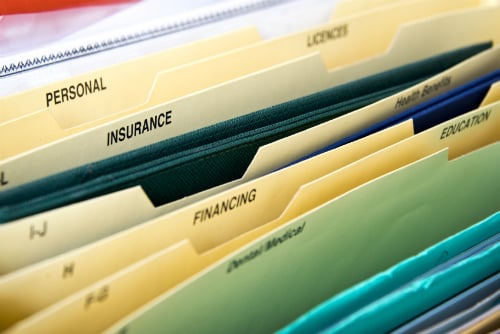5 Essential Tips for Organizing Financial Paperwork

When it comes to personal finance, one of the most daunting tasks for many individuals is organizing financial paperwork. Whether it's your monthly bills, tax documents, insurance policies, or investment statements, keeping all these papers in order can be overwhelming. However, with some strategic approaches, not only can you simplify your financial management, but you can also reduce stress and improve your financial well-being. Here are five essential tips for effectively organizing your financial paperwork.
1. Categorize Your Documents

The first step to a streamlined financial documentation system is categorization. Dividing your papers into specific categories will make it easier to locate documents when needed.
- Essential Documents: These are must-haves such as birth certificates, passports, and wills.
- Financial Statements: Include bank statements, credit card statements, and investment summaries.
- Insurance Policies: Health, home, car, or life insurance policies should be kept together.
- Legal: For contracts, lease agreements, and other legal documents.
- Taxes: Past tax returns and related receipts or deductible documents.
📝 Note: Regularly review and update these categories as your financial life evolves, like when you get a new insurance policy or invest in a new asset.
2. Implement a Filing System

Having a consistent system for storing your documents is crucial. Here's how you can set one up:
- Physical Files: Use labeled folders or hanging file folders in a filing cabinet or box. Clearly label each category and sub-category for easy reference.
- Digital Files: Use digital tools to scan and categorize documents. Software like Evernote, Dropbox, or Google Drive can help in organizing electronic files.
A hybrid system, where you keep the most essential documents physically and others digitally, can be very effective.
| Category | Physical Storage | Digital Storage |
|---|---|---|
| Essential Documents | Fireproof safe or safe deposit box | Encrypted cloud storage |
| Financial Statements | Filing cabinet or organized box | Folders in cloud storage |
| Insurance Policies | Filing cabinet | Cloud storage with alert for renewal |
| Legal | Fireproof safe | Digital copies with legal advisor |
| Taxes | Filing cabinet | Annual folders in cloud storage |

3. Adopt a Schedule for Organization

Like everything in life, financial paperwork needs regular attention:
- Monthly: Review financial statements, pay bills, and file or shred outdated papers.
- Quarterly: Check insurance policies for renewals, assess investment performance.
- Annually: Review your entire financial situation, update wills, and organize tax documents.
⏰ Note: Mark your calendar with these reviews to ensure they're not overlooked.
4. Use Color-Coding for Visual Organization

Humans are visual creatures, and color-coding can make a significant difference:
- Assign each category a unique color. For example:
- Red: Essential Documents
- Blue: Financial Statements
- Green: Insurance Policies
- Yellow: Legal
- Grey: Taxes
This system not only makes organizing more fun but also speeds up the process of finding documents.
5. Regularly Purge Unnecessary Documents

Over time, the accumulation of documents can become unmanageable. Here's how to keep it in check:
- Shred: Sensitive documents like old bank statements or credit reports after retaining them for the required period.
- Recycle: Non-sensitive documents that have no long-term value.
- Retain: Important legal or financial documents. Know your local regulations on how long you must keep financial records.
📚 Note: Always shred documents with personal information to prevent identity theft.
To sum up, by following these five essential tips for organizing financial paperwork, you'll transform the chaotic task of financial management into an orderly, stress-free process. These strategies not only keep your finances in order but also facilitate quick decision-making, protect against identity theft, and provide peace of mind during financial reviews or tax seasons. Remember, organization is an ongoing journey, and with regular maintenance and updates, your financial documents will be well-managed, allowing you to focus on what matters most—your financial goals and future security.
How long should I keep financial documents?

+
Retain tax documents for seven years, bank statements for one year, and keep permanent records like birth certificates indefinitely. Always consult local laws as they may vary.
Can I go paperless with my financial documents?

+
Yes, many financial institutions offer paperless options. Digitizing your documents through scanning or using provided digital services is eco-friendly and efficient. However, always have backup plans and secure your digital files against data loss.
What is the best way to store essential documents safely?

+
Essential documents like wills or property deeds should be stored in a fireproof safe or safe deposit box. Consider digital storage with encryption or password protection for extra security.